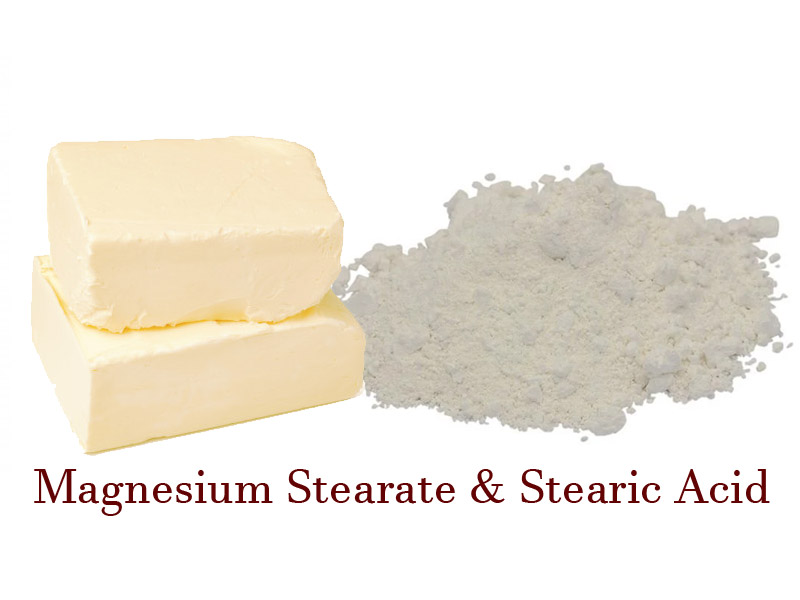Both stearic acid and magnesium stearate are common additives to food, medications, and cosmetics. In this article, we explain what they are and whether they are safe for you and your family.
What is Stearic Acid?
Stearic acid is a long-chain fatty acid that occurs naturally in meat, coconut oil, palm oil, shea butter, and the cocoa butter in chocolate. It’s the second most common saturated fat in the Western diet. You will find it as an additive in many soaps, cosmetics, shampoos, and detergents. Stearic acid has some special properties and is called a surfactant. Surfactants reduce the surface tension in water. They are less likely to stick to themselves and more likely to interact with oils and grease, which is why stearic acid is a part of many cleaning products.
What is Magnesium Stearate?
Magnesium stearate is a soap that is a mixture of stearic acid and the essential mineral magnesium. This compound has been used for decades in the food industry. It works as a binder, thickener, and an emulsifier in some products. In other goods, manufacturers use it as a lubricant, an anti-caking, or an antifoaming agent. It is found in many food products, including candies, chewing gum, herbs, spices, and baking ingredients.
Pharmaceutical companies use it as an excipient. Excipients are the inactive ingredients found in your medicines, vitamins, and pharmaceuticals. Inactive ingredients are the part that doesn’t treat your medical condition. Excipients are there for other purposes, including flavor, assisting in absorption, and extending shelf life.
When you look at your medications, you might notice a fine white power coating the capsules and pills; this is magnesium stearate. Its job is to keep the ingredients in capsules free-flowing, so the medicine stays evenly distributed in the capsule and helps ingredients release at the correct time. Manufacturers also use it to keep the medicine from sticking to the walls of the capsule, and individual pills from sticking to each other. Magnesium stearate also works as a lubricant that keeps the ingredients from sticking to the machines making the pills.
Is Magnesium Stearate and Stearic Acid Safe?
The Food and Drug Administration lists magnesium stearate as being generally safe to consume. To understand why let’s take a look at what happens when these compounds enter your body.
When magnesium stearate is digested, it is broken down into its original components, magnesium, and stearic acid. Magnesium is essential for your body’s processes, including keeping your immune system healthy, bones strong, and heartbeat steady.
Once in the body, stearic acid converts into oleic acid, which is the primary component of olive oil. So, even though stearic acid is saturated fat, it does not affect your blood cholesterol levels, the way other saturated fats do.
Further, the amounts of magnesium stearate and stearic acid used in medications are tiny. Steric acid is typically between .5-10 percent of a tablet, and magnesium stearate is even less, usually between .25 – 1.5 percent. So your typical intake would be about 25 mg of stearic acid and 5 mg of magnesium stearate. On the other hand, if you ate a half of a milk chocolate candy bar, you’d be ingesting 1,283 mg of stearic acid.
Possible Health Concerns
There was a single study in 1990 that seemed to show that stearic acid suppressed the immune activity of T cells in mice. T cells are a kind of white blood cell that helps your immune system react to foreign substances. However, the amount of fatty acids in a healthy human is about 100 times less than what it took to kill the T cells in the mice.
But as with anything, there can always be too much of a good thing. If you overeat magnesium stearate, it can have a laxative effect, and possibly cause diarrhea. Also, magnesium can have a sedative effect, and this can be particularly strong in infants. And though rare, some people do have sensitivities or allergies to magnesium stearate.
There is one item that may be of particular concern to vegans. Stearic acid comes from animal and plant fats. It is found in chicken, eggs, cheese, and salmon. If you are vegan, you will want to ensure that the stearic acid in your supplements is made from vegetable origins. Palm oil is a popular choice among conscious manufacturers.
These compounds are considered generally safe, but that doesn’t mean you should ignore them. If you feel you are having an allergic reaction to your medication or supplements, take note of the inactive ingredients. If you are a vegan for health reasons, you should also be aware of what inactive ingredients your supplements contain, and if they are right for you.

